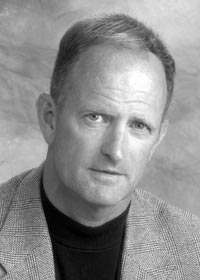Dr. Charles "Jack" V. Jakowatz, Jr.
Manager, Radar Signal Processing Research Group
Sandia National Laboratories
BSEE 1972, MSEE 1973, PhD 1976

The first day Charles "Jack" Jakowatz, Jr. arrived on the Purdue campus, a faculty member told him, "When you graduate from this institution four years down the road, you’re going to have a big permanent "block P" stamped on your forehead—because wherever you go across this country or elsewhere in the world, when you tell people that you are a Purdue University graduate, they will instantly both respect you and expect much of you."
Jakowatz joined Sandia National Laboratories in Albuquerque, New Mexico, in 1976 shortly after receiving his PhD from Purdue. Today he is the group leader for a 12-person research and development team. His current personal research interests are in the area of analytical and applied signal processing for SAR and SONAR, including phase error correction and interferometry.
Looking back over his engineering career, Jakowatz says, "I can identify four guiding principles that helped me gain whatever measure of success I have achieved. They are: 1) Spend most of your time trying to ask good questions. Even though good answers are necessary, all important truths are eventually framed in questions. Besides, it’s fun to be the person asking the hard questions. 2) Stay hungry—every day try to think about something you haven’t contemplated before, or think of an old idea in a new way, or debate one of your thoughts with somebody new. When you’re no longer hungry for truth, you’re pretty much done. 3) When you think that you can’t win at something, remember that hard effort can almost always overcome a lack of natural ability. Gifts are good, but hard work is better. 4) Have a thoughtful position on a few really critical issues. That’s a lot better than half-baked opinions on almost everything."
His passion for education led him to serve as adjunct professor in the College of Engineering at the University of New Mexico at Albuquerque from 1978 to 1993. In 1994, he founded and became managing partner of SAR Education Associates, a small company dedicated to teaching modern imaging radar technology via short courses.
Jakowatz is widely recognized for his many achievements in signal processing. In 1990, he was a joint winner of the R&D 100 Award for the invention of a radar processing methodology known as Phase Gradient Autofocus. He is the author of "Spotlight Mode Synthetic Aperture Radar: A Signal Processing Approach," a major text on SAR, published in 1996. In 1997, he won the E.O. Lawrence Award, one of the U.S. Department of Energy’s top prizes, for achievements that advance the use of synthetic aperture radar. His work was cited for its significant improvements to national security. The citation read, in part: "Jakowatz and his colleagues have made it possible for arms control and treaty verification personnel to patrol by air the borders of formerly warring states and announce definitively whether military equipment has been brought in or removed."
Jakowatz has been married for nearly 30 years to his wife Carol, who received a BS and MS in Audiology and Speech Sciences from Purdue in 1974 and 1975. They have two daughters, Amy and Courtney, who are currently enjoying their college careers.
Reflecting on his Purdue education, Jackowatz says, "There have been many times since that first day at Purdue when I have thought about the "block P" on my forehead. I’ve constantly tried to make sure that I earn the respect it commands."
